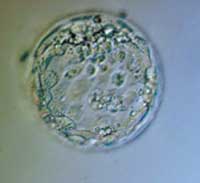Supporters of embryonic stem cell research say it may provide an important path to regenerative medicine, in which diseases ranging from juvenile diabetes to paralysis could be cured using transplants of carefully cultivated stem cells.
So far research has concentrated on using human embryos as a possible way to harvest stem cells, leading to outrage from pro-life groups. But a team at the University of Pittsburgh might have found more ethical alternatives in placentas saved during childbirth.

The primitive cells found in the amnion were coaxed into forming a variety of cell types that look very similar to embryonic stem cells. They do not appear to be immortal, unlike true stem cells. Plus, it is not yet certain that the cells they found are true stem cells, but they carry two important genes which so far have only been seen on embryonic stem cells.
The team tested the cells in lab dishes and got them to form into what looked like heart cells, nerve cells, liver cells and pancreatic cells.
The lab works specifically on liver transplants and they hope to develop the cells to use them instead of donated liver. Pancreatic cells would be important because they could be used to treat diabetes.
Via Scotsman.
